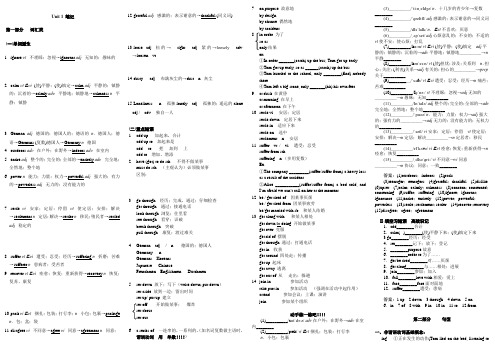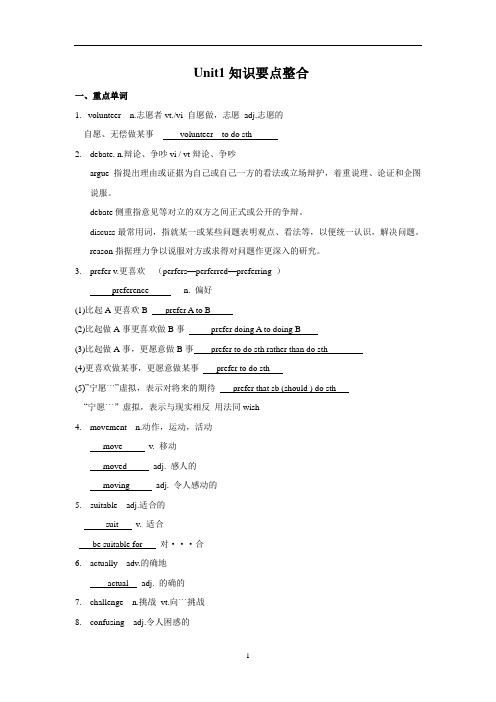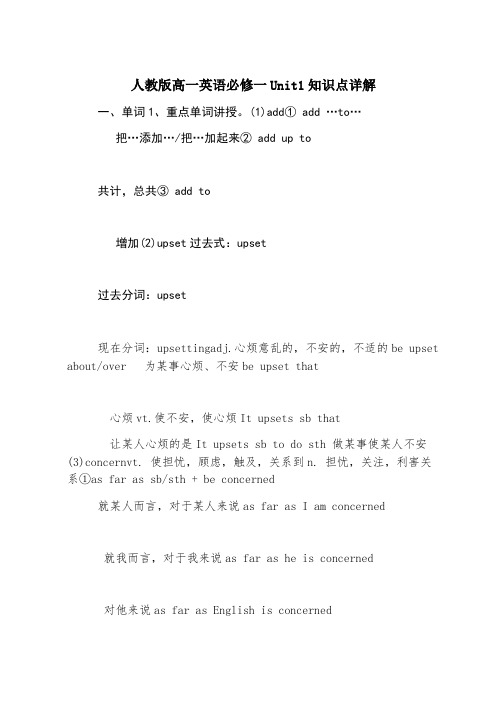unit1 知识点
英语人教版八年级上unit1知识点笔记

Un i t 1 Wh e re d id yo u g o on v acation?1•一般过去时考点1:如何判断一般过去时?考点2:肯定句变否定句。
考点3:变一般疑问和特殊疑问句。
2•复合不定代词/副词构成: _________ _________ ___________ _________其中:(no one意思“______ ”指 __ ,与_________ 同义,且与of连用,做主语谓语用单三。
回答引起的特殊疑问句时要用no one.none意思“ ___ ”,指____________ ,且 __ 与of连用。
谓语单,复形式皆可。
回答 _________ 引起的特殊疑问句时要用none;-anyone意思" _____ ”扌旨___ ,与 __ 同义,且_____ 与of连用。
_any one 意思" ____ ”扌旨___ ,与 __ 同义,且_____ 与of 连用。
nothing= _________________用法:① 复合不定代词做主语,谓语动词用 ________ •②当adj.修饰不定代词要_________ •③ 当不定代词中含有some通常用于__________ ;含有any通常用于_______________我自己myself你自己他自己她自己它自己我们自己你们自己他们自己反身代词在句中可用作动词宾语、介词宾语、表语和同位语等,如:She can dress herself.作动词宾语)That?poor?boy?was?myself.(用作表语)Thefatherhimselfhassomething wrong.(同位语:句中常置于名词、代词之后或句子末尾We clean the room ourselves.(同位语:句中常置于名词、代词之后或句子末尾常用短语:穿衣服;?玩得快乐;随便吃;随便用;2.few 意为___________,修饰__________ 名词,倾向于否定。
英语第一单元知识点梳理

Unit 1 My school
1.重点单词,会读会认会默写:first floor , second floor , teachers’ office , library , playground , computer room, art room , music room .
2.基数词变序数词的口诀:基变序,有规律,词尾加上th,一二三,特殊记,词尾字母tdd.
one→first two→second three→third
在几楼,用方位介词on : 在一楼on the first floor
在二楼on the second floor 在三楼on the third floor
3.library 的复数是libraries
4.提问:Is this / that ...? 这是/那是....吗?
回答:Yes, it is. / No , it isn’t.
5.提问:Where is ....? ....在哪里?回答方位介词。
6.介绍人或物,用This is +人/物.
7.Here is / are +人/物. 意思是:这是.....
8.人称代词变物主代词:we 我们→our 我们的
9.How many +可数名词复数+are there ? 回答数字。
10.礼貌用语:This way, please. 请走这边/这边请。
11.提问:Do you have ....? 你/你们有....吗?
回答:Yes, I/we do. No, I/we don’t.
12.感叹句:How +形容词!意思是:多么....啊!
13. I like +可数名词复数. 意思是:我喜欢....。
高中英语必修一 unit 1知识点笔记及练习

Unit 1 笔记第一部分词汇类(一)单词派生1.ignore v t. 不理睬;忽视→ignorant adj. 无知的;愚昧的2.calm v t.&v i. (使)平静;(使)镇定→calm adj. 平静的;镇静的;沉着的→calmly ad v. 平静地;镇静地→calmness n. 平静;镇静3.German adj. 德国的;德国人的;德语的n.德国人;德语→Germans (复数)德国人→Germany n. 德国4.outdoors ad v. 在户外;在野外→indoors ad v. 在室内5.entire adj. 整个的;完全的;全部的→entirely ad v. 完全地;全然地;整个地6.power n. 能力;力量;权力→powerful adj. 强大的;有力的→powerless adj. 无力的;没有能力的7.settle v i. 安家;定居;停留v t. 使定居;安排;解决→settlement n. 定居;解决→settler n. 移民;殖民者→settled adj. 稳定的8.suffer v t.&v i. 遭受;忍受;经历→suffering n. 折磨;苦难→sufferer n. 患病者;受苦者9.recover v t.&v i. 痊愈;恢复;重新获得→recovery n. 恢复;复苏,康复10.pack v i.&v t. 捆扎;包装;打行李;n. 小包;包裹→packagen.包;盒;袋11.disagree v i. 不同意→agree v i. 同意→agreement n. 同意;12.grateful adj. 感激的;表示谢意的→thankful (同义词)13.loose adj. 松的→tight adj. 紧的→loosely adv.→loosen vt.14.dusty adj. 布满灰尘的→dust n. 灰尘15.Loneliness n. 孤独lonely adj. 孤独的;遥远的aloneadj./ adv. 独自一人(二)重点短语1.add up 加起来,合计add up to 加起来是add.... to... 把.....加到.....上add to 增加,增添2.have (got) to do sth 不得不做某事must do sth (主观认为)必须做某事区别:3.go through 经历;完成,通过;仔细检查get through 通过;接通电话look through 浏览;往里看see through 看穿;识破break through 突破pull through 康复;渡过难关4.German adj. / n. 德国的;德国人Germany n.Germans KoreansJapanese ChineseFrenchmen Englishmen Dutchmen5.set down 放下;写下(write down; put down)set aside 放到一边;留出时间set up/ put up 建立set off 开始做某事;爆炸set aboutset out6. a series of 一连串的,一系列的。
高中英语 人教版必修一unit1 知识要点整合

Unit1知识要点整合一、重点单词1.volunteer n.志愿者vt./vi 自愿做,志愿adj.志愿的自愿、无偿做某事volunteer to do sth2.debate. n.辩论、争吵vi / vt辩论、争吵argue指提出理由或证据为自己或自己一方的看法或立场辩护,着重说理、论证和企图说服。
debate侧重指意见等对立的双方之间正式或公开的争辩。
discuss最常用词,指就某一或某些问题表明观点、看法等,以便统一认识,解决问题。
reason指据理力争以说服对方或求得对问题作更深入的研究。
3.prefer v.更喜欢(perfers—perferred—preferring )preference n. 偏好(1)比起A更喜欢B prefer A to B(2)比起做A事更喜欢做B事prefer doing A to doing B(3)比起做A事,更愿意做B事prefer to do sth rather than do sth(4)更喜欢做某事,更愿意做某事prefer to do sth(5)”宁愿```”虚拟,表示对将来的期待prefer that sb (should ) do sth“宁愿```”虚拟,表示与现实相反用法同wish4.movement n.动作,运动,活动move v. 移动moved adj. 感人的moving adj. 令人感动的5. suitable adj.适合的suit v. 适合be suitable for 对···合6.actually adv.的确地actual adj. 的确的7.challenge n.挑战vt.向```挑战8.confusing adj.令人困惑的confused adj.感动困惑的confuse v.使···困惑confusion n..困惑8. fluent adj.流利的fluency n.流利;(1)在```很流利be fluent in9.graduate v.毕业n.毕业生graduation n.毕业(1)从```毕业__graduate from10. recommend v. 建议recommendation n.建议(1)向某人推荐、介绍``` recommend sth to/with sb(2)推荐某人做``` recommend sb for ```(3)推荐某人为``` recommend sb as ```(4)推荐某物做``` recommend sth for ```(5)建议做``` recommend doing ```(6)建议某人做``` recommend sb to do ```(7)建议``` recommend that sb (should ) do ```“一坚持,二命令,三建议,四要求”---insist/order/command/advise/suggest/recommend/ask/require/request/demand 11.advance n.进步v. 推动advanced adj.先进的,高级的in advance 事先,提前in advance of 在……前面,超过,比……进步on the advance 在上涨12.obviously adv.显然地obvious adj.显然的13. responsible adj.有责任的responsiblity n. 责任(1)对```负责___be responsible for_____14. editor n.编辑edit v.编辑15.schedule n. 工作计划,日程安排v.安排,预定(1)按时__on schedule(2)提前__ahead of schedule16.expert vi担任专家;n.专家adj.熟练的,内行的(1)在```上很内行__be expert in /be an expert in 17. behavior n.行为、动作behave v.行为17.attract v.吸引attraction n.吸引力attractive adj.有吸引力的(1吸引至```___attract to(2)吸引注意力___attract one’s attention19. addict vt. 使上瘾n.瘾君子addiction n. 上瘾addictive adj. 使人上瘾的addicted n. 上瘾的(1)对``上瘾be addicted to _20. wealth n. 财富wealthy adj. 富有的二、重点短语1. enjoy doing 喜欢做某事2. make all the difference 改变一切,大不相同3. clean up 打扫4.sign up签约sign up for 报名参加、注册5.on one’own 独自6.hand out 分发7. in the community 在社区中8. be used to doing sth 习惯于做某事9.keep up with追赶10. be prepared for 准备好```11. do well in 在```做得好12. try out for 参加```的选拔13.practice doing 练习做某事14. make the team 组队15. make a fire 生火16. learn sth from sb向某人学习```17. give a speech 做演讲18. get started 开始19. have fun 玩得开心20. focus on 集中注意力在21. encourage sb to do sth 鼓励某人做某事22. feel lonely 感到孤独23. in a good order 井然有序地24. quit doing 放弃做某事25. work out 算出,解答出26. drop out of school 辍学27. be grateful to sb for sth 对某人做某事表示感激28. be pleased to do sth 很高兴做某事29. introduce sb to sb 把某人介绍给某人30. aim to 目的在31. be the same as 和```一样32. be similar to 和```相似33. agree with sb/sth 同意某人/某事三、重点句型1. since 因为I am sure he will listen to you, since you are his good friend.2.be+adj+to dothe handwriting is easy to read.。
英语第一单元知识点

Unit 1 My Classroom 第一单元我的教室知识点归纳一、听英语课本第4—8页录音,每天至少一遍。
二、读词汇(要求能够听懂、会说、明白汉语意思)物品类:window(窗户)blackboard(黑板)light (电灯)picture(图画)door(门) floor(地板) computer(计算机)teacher’s desk(讲台) wall(墙壁)fan (风扇)其他类:really(真的) near(距离近) TV(电视) clean(打扫) help(帮助) 三、读句型(要求能够听懂、会说、明白汉语意思)We have a new classroom.(我们有一个新教室。
)It’s so big. (它很大。
)What’s in the classroom?(教室里有什么?)One blackboard, one TV, many desks and chairs. (一个黑板,一个电视,很多的桌子和椅子。
)Let’s go and se e !(让我们去看看吧!)Where is it? It’s near the window. (它在哪里?在窗户附近。
)Let’s clean the classroom. (让我们打扫教室吧。
)OK.(好的。
)Let me clean the blackboard.(让我擦黑板。
)Let me help you.(让我帮你吧。
)Thank you. (谢谢你。
)Look! This is the new classroom. (看!这是一间新的教室。
)The door is orange.(门是橙色的。
)The desks are green.(书桌是绿色的。
)Open the door (打开门。
)Turn on the light.(打开灯。
)Put up the picture. (挂图画。
)Clean the blackboard. (擦黑板。
五年级英语Unit1知识点

Unit 1 My New Teachers一、词汇全解1. young /jʌŋ/ adj. 年轻的【反义词】old adj. 年老的【短语】young and old 老老少少,young people 年轻人【句子】Young people should try their best to do everything well.年轻人应该尽他们的全力做好每件事情。
2. funny /fʌni/ adj. 滑稽可笑的【形近词】sunny adj.阳光充足的【拓展】fun n. 快乐;乐趣【句子】Our music teacher is very funny. 我们的音乐老师非常有趣。
3. tall /tɔ:l/ adj. 高的【反义词】short adj.矮的【形近词】wall 墙,ball 球【句子】Yao Ming, a famous basketball player, is very tall.著名的篮球运动员姚明长得非常高。
4.strong /strɔŋ/ adj. 强壮的;坚强的【形近词】wrong adj.错误的【句子1】His P.E. teacher is very strong. 他的体育老师非常强壮。
【句子2】My Grandmother is a strong woman. 我祖母是位坚强的女性。
5. kind /kaind/ adj. 和蔼的;亲切的n. 种类【形近词】find v.发现【句子】Her math teacher has a kind heart.她的数学老师有一颗善良的心。
6. old /əuld/ adj. 年老的;旧的【形近词】cold adj.冷的【句子1】Never too old to learn. 活到老,学到老。
【句子2】She has an old winter coat. 她有一件冬天穿的旧大衣。
7.short /ʃɔ:t/ adj. 矮的;短的【形近词】shirt n.衬衫【句子1】He’s short and thin. 他又矮又瘦。
unit1知识点

unit1知识点
以下是Unit 1的知识点:
1. 问候和自我介绍:
- 问候的常用表达:Hello, hi, good morning/afternoon/evening, how are you?
- 自我介绍的常用句型:My name is xxx. I am xx years old. I come from xxx.
2. 介绍家庭成员:
- 家庭成员的称呼:father, mother, brother, sister, grandparents, etc.
- 介绍家庭成员的常用句型:This is my father/mother/brother/sister. His/Her name is xxx.
3. 询问和回答个人信息:
- 询问名字:What's your name?/What's your full name?
- 询问年龄:How old are you?
- 询问国籍:Where are you from?
- 回答个人信息的常用句型:My name is xxx. I am xx years old. I come from xxx.
4. 简单的日常用语:
- 感谢:Thank you. Thanks a lot.
- 道歉:I'm sorry. I apologize.
- 请问:Excuse me, can I ask you a question?
5. 时态:
- 一般现在时:表述经常发生的事情、事实和真理。
- 现在进行时:表示现在正在进行或发生的动作。
这些是Unit 1的主要知识点,希望对你有帮助!。
人教版高一英语必修一Unit1知识点详解

人教版高一英语必修一Unit1知识点详解一、单词1、重点单词讲授。
(1)add① add …to…把…添加…/把…加起来② add up to共计,总共③ add to增加(2)upset过去式:upset过去分词:upset现在分词:upsettingadj.心烦意乱的,不安的,不适的be upset about/over 为某事心烦、不安be upset that心烦vt.使不安,使心烦It upsets sb that让某人心烦的是It upsets sb to do sth 做某事使某人不安(3)concernvt. 使担忧,顾虑,触及,关系到n. 担忧,关注,利害关系①as far as sb/sth + be concerned就某人而言,对于某人来说as far as I am concerned就我而言,对于我来说as far as he is concerned对他来说as far as English is concerned关于英语,对于英语②be concerned about/f or关心,挂念have no concerned about/for③be concernedin/with触及到,与…有关have no concerned in/with(4)go through①经历,遭受,忍受go through one difficulty after another.经历一个又一个困难。
②仔细检查,审查go through your paper 检查你的试卷。
③浏览,翻阅go through all the related reference.浏览相干资料。
④通过,穿过=pass throughgo through a great forest.穿过一片大森林。
⑤完成go through the task.完成任务。
(5)suffer①suffer 作“遭受”时,后面直接接pain, loss, injury, harm或punishment.②suffer 作“受…苦”时,常常搭配:sufferfrom(6)get/be tired of厌烦…get/be/feel tired of sb / sth / doing sth 厌烦be tired from由于…而疲劳(体力上的疲劳),侧重原因be tired out精疲力竭的(7)join in 参加,加入区分join ,join in ,attend 与 take part in:join:多指加入组织,团体,党派等,有作为其中一员的意思。
- 1、下载文档前请自行甄别文档内容的完整性,平台不提供额外的编辑、内容补充、找答案等附加服务。
- 2、"仅部分预览"的文档,不可在线预览部分如存在完整性等问题,可反馈申请退款(可完整预览的文档不适用该条件!)。
- 3、如文档侵犯您的权益,请联系客服反馈,我们会尽快为您处理(人工客服工作时间:9:00-18:30)。
Unit 1 知识点汇总
1. 问路的句型---Where is…?
课文应用:Where is the museum shop?(博物馆商店在哪里?)
It’s near the door.(在大门附近。
)
句型结构:问句---Where is+地点?
答句---It’s+表示地点的词语(near the park; over there; next to the school…)此问句是由特殊疑问词where 引导的一个特殊疑问句,where意为“在哪里,到哪里”,用来询问地点,放在句子的开头。
where is 后接名词或代词的单数形式,where are 后接名词或代词的复数形式。
2. 如何表达“我想要…”---I want to …
课文应用:I want to buy a postcard.(我想要买一张明信片。
)
句型结构:I want to+动词原形+其他。
3. It’s near the door.(在门的附近。
)
此句中near是表示位置的介词,意为“旁边,附近”,其同义句是:It’s next to the door.(它在门的旁边。
)
·neat与next to的不同:near和next to都可以表示较近的距离,但是next to表示“挨着;与…相邻”,而near表示“在…附近”。
很显然,near表示的范围更大一些。
4. 询问怎么到某地的句型
课文应用:How can we get there?(我们怎么到那儿?)
句型结构:How can+主语+get (to)+地点?
回答时,可以用“turn left, turn right, go straight.”等用来指路的句型回答。
同时表示在某处的介词用at。
如:Turn left at the bookstore. Then turn right at the hospital. 此句5. Is the Thames far from here? No.此句是个be动词开头的一般疑问句,其回答要用yes或no.句中的far from意为“离……远”。
反义词组为near to.。
